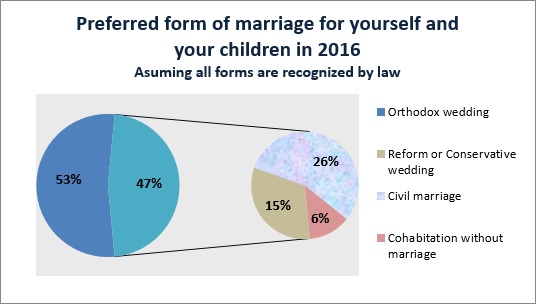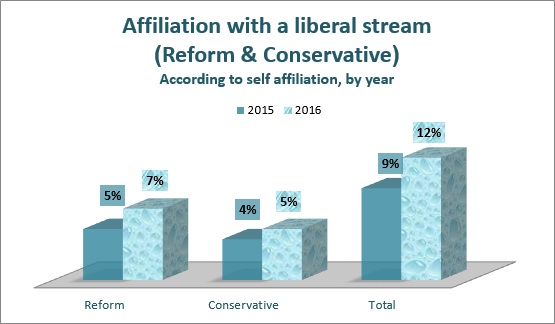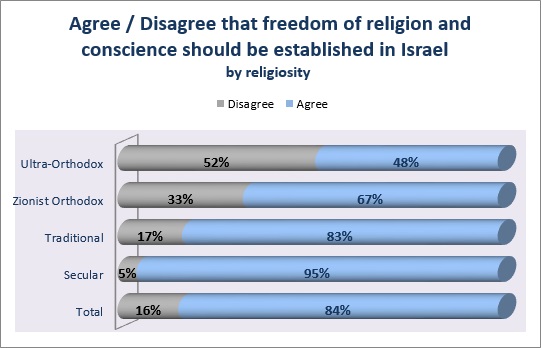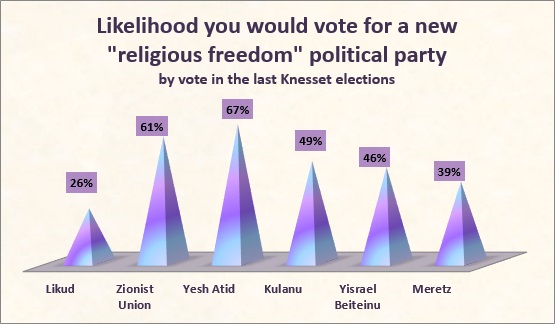Support for religious freedom and equality continues to increase
The 2016 Israel Religion & State Index
81% of Israeli Jews are dissatisfied with the Government's activities in the realm of religion & state; 66% support the Kotel compromise; 66% support freedom of marriage; 4 out of 5 secular Jews do not want to marry via the Orthodox Rabbinate.
04/10/2016 11:17
Tags: Hiddush polls · marriage freedom · religious freedom · Religion & State Index
The Index demonstrates once again the commonality of will of both Israelis and American Jewry, who want to see Israel as an inclusive, modern and egalitarian Jewish and democratic state! Governmental policies that undermines these values threaten to break the bond between Israel and world Jewry and weaken Israeli society.
Further, it reflects the Government's total disregard for the public's will. No wonder, therefore, that the Index found a high level of support for a new political party that would promote religious freedom. This should serve as a warning to all of the civil political parties.
CLICK HERE TO DOWNLOAD THE 2016 ISRAEL RELIGION & STATE INDEX
4 out of 5 secular Israelis would prefer alternative weddings
The most revolutionary Index finding is the dramatic increase in the percentage of respondents who would prefer not to have Orthodox weddings for themselves or their children. This year, 47% expressed this preference, compared to 37% last year, including 78% of secular Jews (i.e. 4 in 5 do not want Orthodox wedding ceremonies). A common assumption over the years has been that while marriage freedom is a critical battle in Israel’s arena of religion and state, most Israelis would still prefer to have Orthodox weddings. However, this year's Index completely changes our understanding of social reality. Nearly half of Israeli Jews are interested in alternatives to the Chief Rabbinate. 66% support freedom of marriage and allowing for civil as well as non-Orthodox weddings alongside the existing Orthodox monopolistic officiation.
This is not the only issue on which the public expresses its utter lack of confidence in the Chief Rabbinate. 81% of Israeli Jews support doing away with the monopoly of the Chief Rabbinate on kashrut certification and opening the market to competition. 51% support opening the market to all of the Jewish streams, and 29% support opening the market exclusively to Orthodox organizations.

Support for the Kotel compromise, a growing percentage identify with Reform/Conservative and a clear majority support granting the non-Orthodox movements equal official status with Orthodoxy
The Index tested the public's attitude the Western Wall compromise. 66% of the Jewish public supports the Western Wall compromise that the Government officially made with the Reform and Conservative movements and Women of the Wall, which the Government never implemented. This agreement designated the Western Wall area around Robinson's Arch as an alternative, pluralistic prayer plaza to be administered by the Reform and Conservative movements. 88% of secular Jews support the compromise, but 78% of Zionist Orthodox and 96% of ultra-Orthodox Jews oppose it. Of importance is the fact that 55% of respondents said they would make use of the pluralistic prayer plaza. Of these, 34% would use it exclusively, and 21% would make use of the pluralistic plaza as well as the traditional plaza with gender separation.

12% of the Jewish population defines itself as belonging to one of the non-Orthodox streams - Reform (7%) or Conservative (5%). This is an increase of one-third from the previous Index (9%). This likely means that such respondents would turn to Reform and Conservative communities for bar mitzvahs, weddings, and holidays. This self-identification indicates a significant penetration into Israeli public consciousness. In fact, 64% of Jewish Israelis (nearly two-thirds) believe Israel should grant equal status to the three major Jewish religious streams - Conservative, Orthodox, and Reform.
84% support the actualization of the Declaration of Independence's guarantee of freedom of religion and conscience
In the Jewish community there is very broad opposition to the Government's actions in the arena of religion and state. This is the primary conclusion of the 2016 Israel Religion & State Index, conducted by the Smith Polling Institute for Hiddush - Freedom of Religion for Israel. A great majority of 84% support the actualization of the Declaration of Independence's guarantee of freedom of religion and conscience. This has held stable throughout the years since the Index was first launched. Support for separation of religion and state continues to rise. This year it stands at 63%, compared to 61% during the previous two years and 55% in most previous surveys.

While the Government passed a law exempting State funded ultra-Orthodox schools from teaching core curricular studies, 82% of the Jewish public supports mandating these schools to teach mathematics, English, science, and civics. While the Government passed a law exempting yeshiva students from IDF enlistment, 83% of the Jewish public (and 83% of Likud voters) support mandating military or civic service for all or most yeshiva students. The Government has doubled State funding for yeshivas, but 79% of the public believes this State funding should be cancelled entirely (39%) or cut significantly (40%). 79% of the Jewish public believes that all ultra-Orthodox men should enter the workforce (37%) or that the number of full-time yeshiva students should be greatly reduced (42%).
An overwhelming majority also supports the religion-state initiatives thwarted by the Government Coalition. Support for public transport on Shabbat continues to rise steadily. 73% support operating public transport on Shabbat on a full scale (23%) or a partial scale (50%). Support has risen from 58% in 2010. Support for official State recognition of all forms of marriage also rose to 66% this year from 64% last year.
Given all of this, it's unsurprising to find that 81% of Israelis are dissatisfied with the Government's activities in the realm of religion & state. Shas is the only party with a majority of voters (52%) who expressed their satisfaction with the Government in this regard. 54% of secular Jews and 38% of the public said that there would be a high or very high likelihood that they would vote for a newly established political party that aims to advance religious freedom and equality of civic burden.
The prestigious Israel Religion & State Index was established seven years ago, and is published annually on the eve of Rosh HaShana. This is the ninth Index report, and it covers scores of key issues facing Israel in this arena. The survey was conducted via telephone on July 25-27 with a larger than usual sample size of 700 people representing Israel's adult Jewish population that included increased representation of the Zionist Orthodox community to allow for deeper analysis of this sector of the population. The Index is the most comprehensive annual study of religion and state affairs in Israel, designed to monitor shifts in public opinion. This publication was made possible through a generous grant from the Stanley, Marion, Paul and Edward Bergman Foundation and support from the Israel Religious Expression Platform.
The Index demonstrates once again the commonality of will of both Israelis and American Jewry, who want to see Israel as an inclusive, modern and egalitarian Jewish and democratic state! Governmental policies that undermines these values threaten to break the bond between Israel and world Jewry and weaken Israeli society. Further, it reveals the Government's total disregard for the public's will regarding matters of religious freedom and equality of civic burden. The divide between the will of the public and the Government Coalition's actions is increasing. Even the voters of key Coalition parties (Likud, Yisrael Beiteinu, and Kulanu) oppose their policies regarding the clash of religion and state.

All of the civil political parties should carefully study the findings of the question that measures the potential response to the establishment of a new centrist political party that would focus on advancing religious freedom and equality of civic burden. There is no doubt that the broad public support for such a party indicates the importance of religion and state issues in the public's mind, as well as the public's sense of abandonment by the Government and the existing parties. The civil coalition parties sell off the public's religious freedoms for a mess of political porridge, and the civil opposition parties avoid confronting the ultra-Orthodox parties, hoping to one day form a left wing Government Coalition with their support. The Index findings should serve as a warning to all of the civil parties.